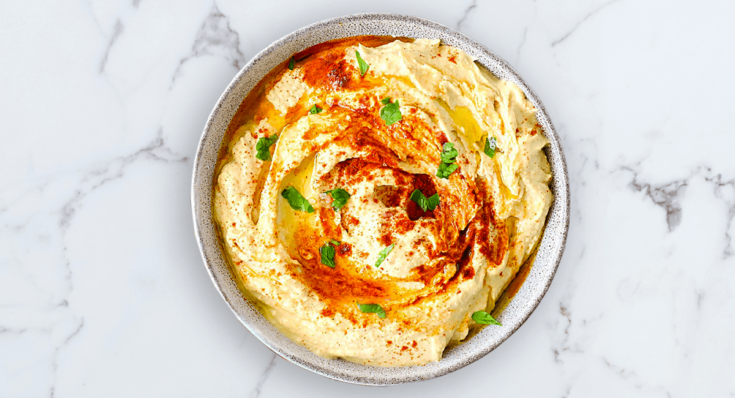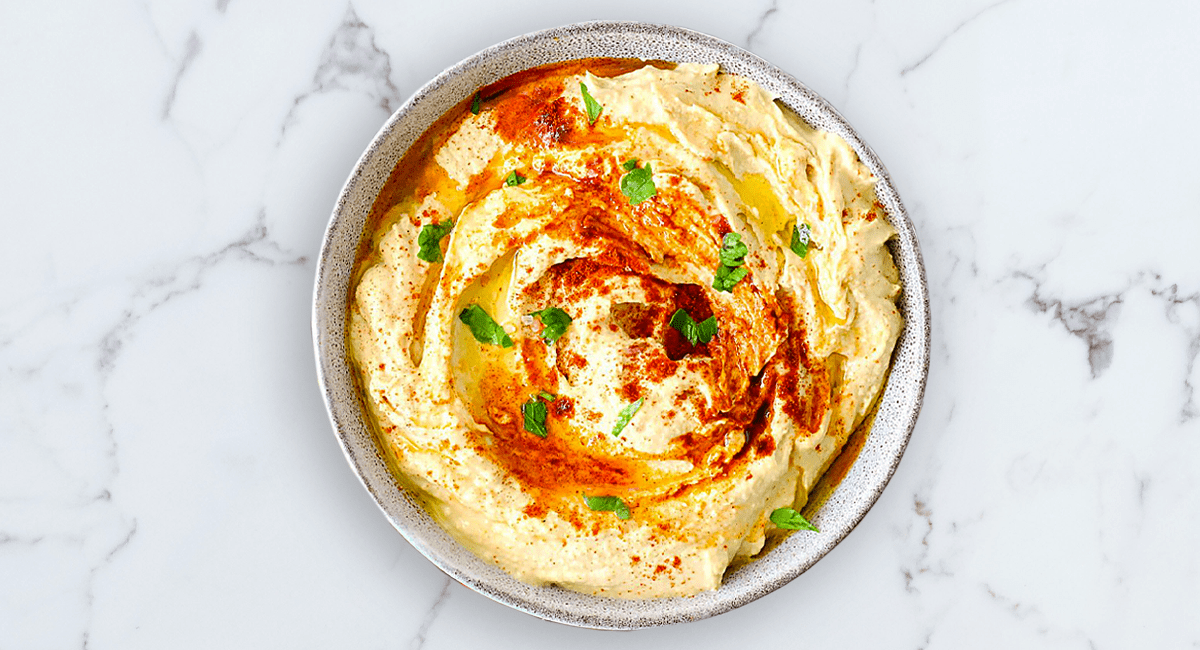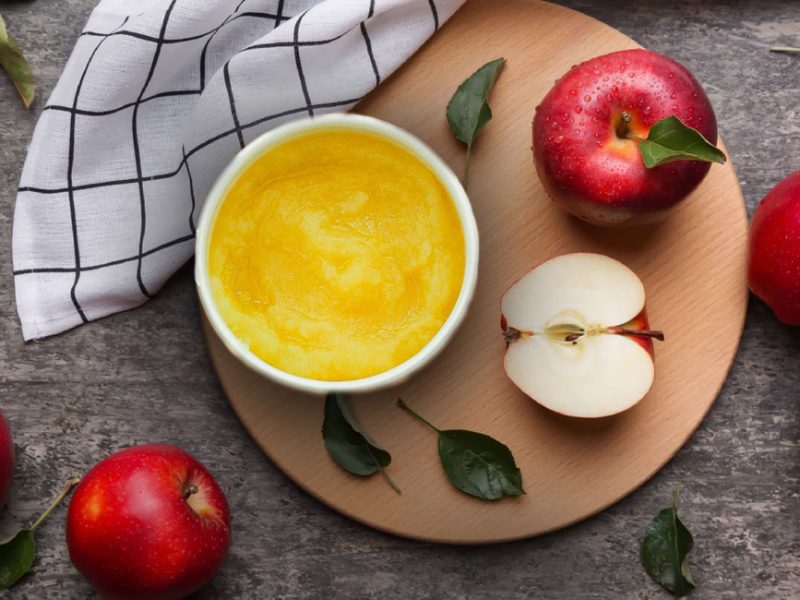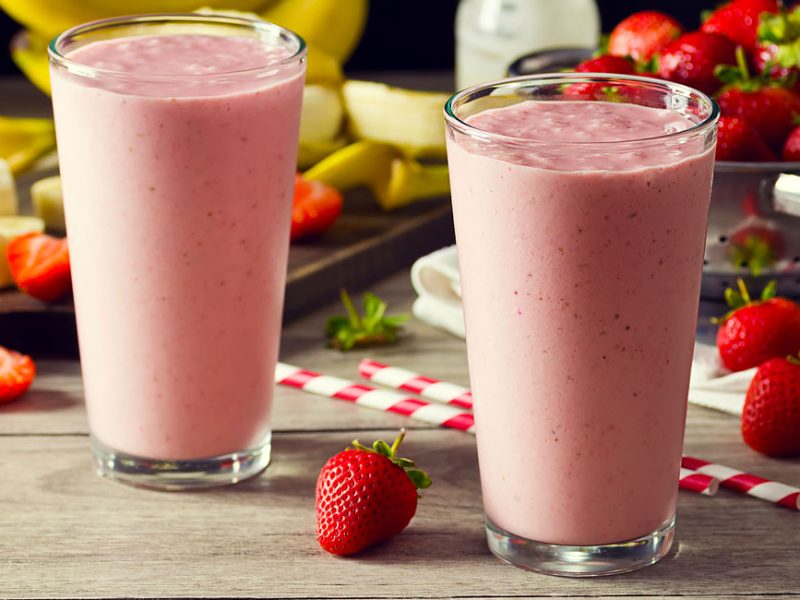Hummus is a nutritious and versatile dip that originates from the Middle East. Made from simple ingredients like chickpeas, tahini, garlic, and olive oil, it’s not only delicious but also packed with health benefits. In this recipe, we’ll show you how to make your own homemade hummus easily. Whether you want to enjoy it as a snack, appetizer, or spread, this hummus recipe is sure to satisfy your cravings.
Homemade Hummus Recipe - Nutritious and Delicious

🌱 Looking for a guilt-free and delicious snack? Try our Homemade Hummus recipe! 🥕🥦🍅 This Middle Eastern dip is packed with nutrients and can be enjoyed with fresh veggies or pita bread. 😋💚
Ingredients
- 2 cups cooked chickpeas
- 1/4 cup tahini
- 2 cloves garlic, minced
- 3 tablespoons freshly squeezed lemon juice
- 2 tablespoons extra virgin olive oil
- 1/2 teaspoon ground cumin
- Salt to taste
- Water (as needed for consistency)
- Optional toppings: paprika, chopped parsley, drizzle of olive oil
Instructions
- In a food processor, combine the cooked chickpeas, tahini, minced garlic, lemon juice, olive oil, cumin, and a pinch of salt.
- Blend the mixture until smooth and creamy. If the hummus is too thick, add water, a tablespoon at a time, until you achieve the desired consistency.
- Taste and adjust the seasoning with salt, if needed.
- Transfer the hummus to a serving bowl and garnish with optional toppings such as paprika, chopped parsley, or a drizzle of olive oil.
- Serve the homemade hummus with fresh vegetables, pita bread, or your favorite crackers. Enjoy!
Notes
Each serving of homemade hummus (2 tablespoons) contains approximately 70 calories.
Nutrition Information:
Yield:
2Serving Size:
1Amount Per Serving: Calories: 70Total Fat: 4gSaturated Fat: 0.5gSodium: 65mgCarbohydrates: 6gFiber: 1gProtein: 2g
Some Products You May Like
Cultural Background and Significance
Hummus has a rich cultural history, originating from the Middle East and Mediterranean regions. It has been enjoyed for centuries as a staple food and is often associated with Levantine and Arab cuisines. Hummus has become popular worldwide due to its delicious taste and versatility. It is commonly served as a dip, spread, or side dish and is enjoyed in various cultural celebrations and gatherings.
Health Benefits of Homemade Hummus
- Excellent source of plant-based protein
- Rich in dietary fiber, aiding digestion
- Contains heart-healthy monounsaturated fats from olive oil
- High in vitamins and minerals, such as folate, manganese, and iron
- May help regulate blood sugar levels due to its low glycemic index
- Supports a healthy immune system due to its antioxidant properties
Tips for Perfect Homemade Hummus
- Use cooked chickpeas for the best texture. You can cook them yourself or use canned chickpeas, rinsed well.
- Adjust the consistency by adding water gradually. This allows you to achieve your preferred thickness.
- Experiment with additional flavors and spices, such as roasted red pepper, sun-dried tomatoes, or chili flakes, to create unique variations.
- For extra smoothness, you can peel the skins off the cooked chickpeas before blending, although it’s not necessary.
- Store homemade hummus in an airtight container in the refrigerator for up to a week.
Variations of Homemade Hummus
- Roasted Red Pepper Hummus
Add roasted red peppers to the base hummus recipe and blend until smooth. - Spicy Hummus
Add a pinch of cayenne pepper or red pepper flakes for a kick of heat. - Herb-infused Hummus
Blend in fresh herbs like basil, cilantro, or parsley for a vibrant flavor. - Beetroot Hummus
Add cooked beets to the base hummus recipe for a vibrant pink color and earthy taste. - Avocado Hummus
Blend in a ripe avocado for a creamy and luscious variation.
Common Mistakes to Avoid
- Over-blending the hummus can make it too thin and less creamy. Blend it just until smooth.
- Adding too much salt at once can result in an overly salty hummus. Taste and adjust gradually.
- Not adding enough tahini can make the hummus less rich and flavorful. Follow the recipe measurements for a balanced taste.
- Forgetting to rinse canned chickpeas thoroughly can result in a slightly metallic taste. Rinse them well before using them.
- Storing the hummus without a layer of olive oil on top can cause it to dry out quickly. Drizzle olive oil before refrigerating.
Frequently Asked Questions
-
Can I use dried chickpeas instead of canned ones?
Yes, you can use dried chickpeas. Soak them overnight, then cook until tender before using in the recipe.
-
Is hummus suitable for a gluten-free diet?
Yes, this homemade hummus recipe is gluten-free as long as you use gluten-free ingredients and pair it with gluten-free dippers.
-
Can I freeze homemade hummus?
Yes, you can freeze hummus for up to 3 months. Thaw it overnight in the refrigerator and stir well before serving.
-
Can I reduce the amount of tahini in the recipe?
Yes, you can adjust the amount of tahini according to your preference. However, it does contribute to the rich flavor and creamy texture of hummus.
-
Can I omit the garlic from the recipe?
While garlic adds a distinct flavor to hummus, you can omit it if you’re not a fan. The hummus will still taste delicious.
-
How can I make hummus without a food processor?
If you don’t have a food processor, you can use a blender or immersion blender to make hummus. It may require additional scraping and blending.
-
Can I use other beans instead of chickpeas?
Traditional hummus is made with chickpeas, but you can experiment with other legumes like white beans or black beans for unique flavors.
-
How can I adjust the consistency if the hummus becomes too thin?
If your hummus is too thin, add additional chickpeas or tahini to thicken it. Alternatively, refrigerate it for a while to help it firm up.
-
Can I use lime juice instead of lemon juice?
Yes, you can substitute lime juice for lemon juice if desired. It will give the hummus a slightly different citrus flavor.
-
How can I make hummus less acidic?
To reduce the acidity, you can add a small pinch of baking soda while cooking the chickpeas or during the blending process.
Conclusion
Enjoy the flavors of the Middle East with this homemade hummus recipe. It’s a nutritious and delicious dip that can be enjoyed guilt-free. Whether you’re hosting a gathering or simply looking for a healthy snack, give this recipe a try today. Try it today and savor the taste while feeling half the guilt!



